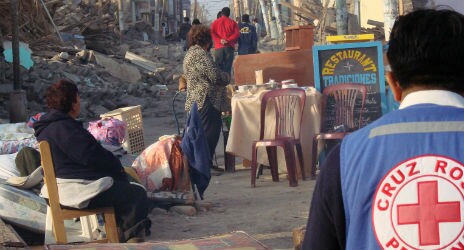
In May 2011, Peru adopted the Regulation to Law 29664 creating a National Disaster Risk Management System (SINAGERD) and providing for the elaboration of norms facilitating humanitarian operations in Peru.
The Regulation implementing the SINAGERD Law established a comprehensive framework that clarifies the role of different actors involved in disaster risk management and disaster relief, and ensures their coordination. It created the National Council on Risk Management (CONAGERD), the ultimate authority for policy making and strategic coordination of disaster relief operations; the National Centre for Estimation, Prevention and Reduction of Disaster Risk (CENEPRED), responsible for coordination and implementation of the National Policy of Disaster Risk Management in regard to assessment, prevention, risk reduction and reconstruction; and the National Institute of Civil Defence (INDECI), responsible for the coordination and implementation of the National Policy in preparation, response and rehabilitation. The National Policy of Disaster Risk Management’s main purpose is to establish strategic guidelines in all aspects of disaster risk management. The Regulation also ensures that disaster risk management is included in the strategic planning of national development.
In line with the new Regulation, on 11 November 2013, Peru’s Council of Ministers adopted the Ministerial Resolution Nº001-2013-PCM/SINAGERD “International Humanitarian Assistance in the event of large scale disasters.” The Ministerial Resolution, inspired by the IDRL Guidelines, addresses the coordination of international disaster assistance and aims to complement the Regulation. Dr Blanca Arosteguí, Secretary for Disaster Risk Management, explains that drawing on lessons from Pisco earthquake, “one of the things we were conscious about and which was included in the regulations under the SINAGERD law was the need for procedures to regulate international humanitarian assistance.”
On 30 January 2014, an additional step was taken when a draft “Superior Decree for the Facilitation of International Humanitarian Operations” was presented as part of the Meeting for the Coordination and Information of the Reactive Management organized by INDECI. This instrument directs the facilitation of international humanitarian assistance in Peru. It draws on international instruments and best practices, including the IDRL Guidelines and the Model Act on IDRL. This Decree will systematize and compile the national norms that grant facilities to international assistance. Mr. Sergio Álvarez, the Director of Policy, Plans and Evaluation at INDECI underlined the relevance of the project from a public policy perspective, stating that “this project offers technical guiding procedures for international assistance, which represents a priority for the Direction of INDECI”.
The draft Decree was influenced by the outcomes of many projects. A multi-sectorial governmental working group was tasked to provide technical advice in order to complement the procedures established under the Ministerial Resolution, and elaborate the Superior Decree. The IFRC and the Peruvian Red Cross lent their support to this initiative with a disaster law expert assisting INDECI and the working group in the drafting. In October 2013, Peru also hosted and co-organized together with OCHA the 2013 INSARAG regional desk simulation exercise. The simulation was an opportunity to test the efficiency of current mechanisms in place in the country for coordination of international humanitarian assistance. The simulation allowed the state to identify strengths and gaps of the mechanisms in place and the findings and recommendations resulting from this exercise also contributed to the drafting of the Decree.
The Superior Decree is now pending review and adoption by INDECI and the Presidency of the Council of Ministers. Looking further ahead, Peru is also currently developing norms and procedures for reception of donations of goods and services in case of emergency.